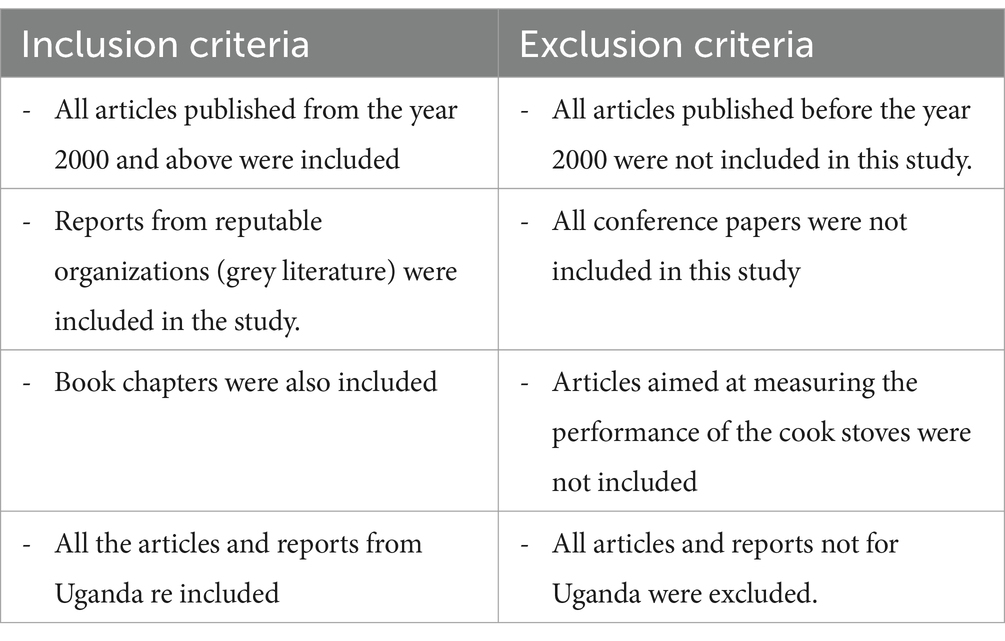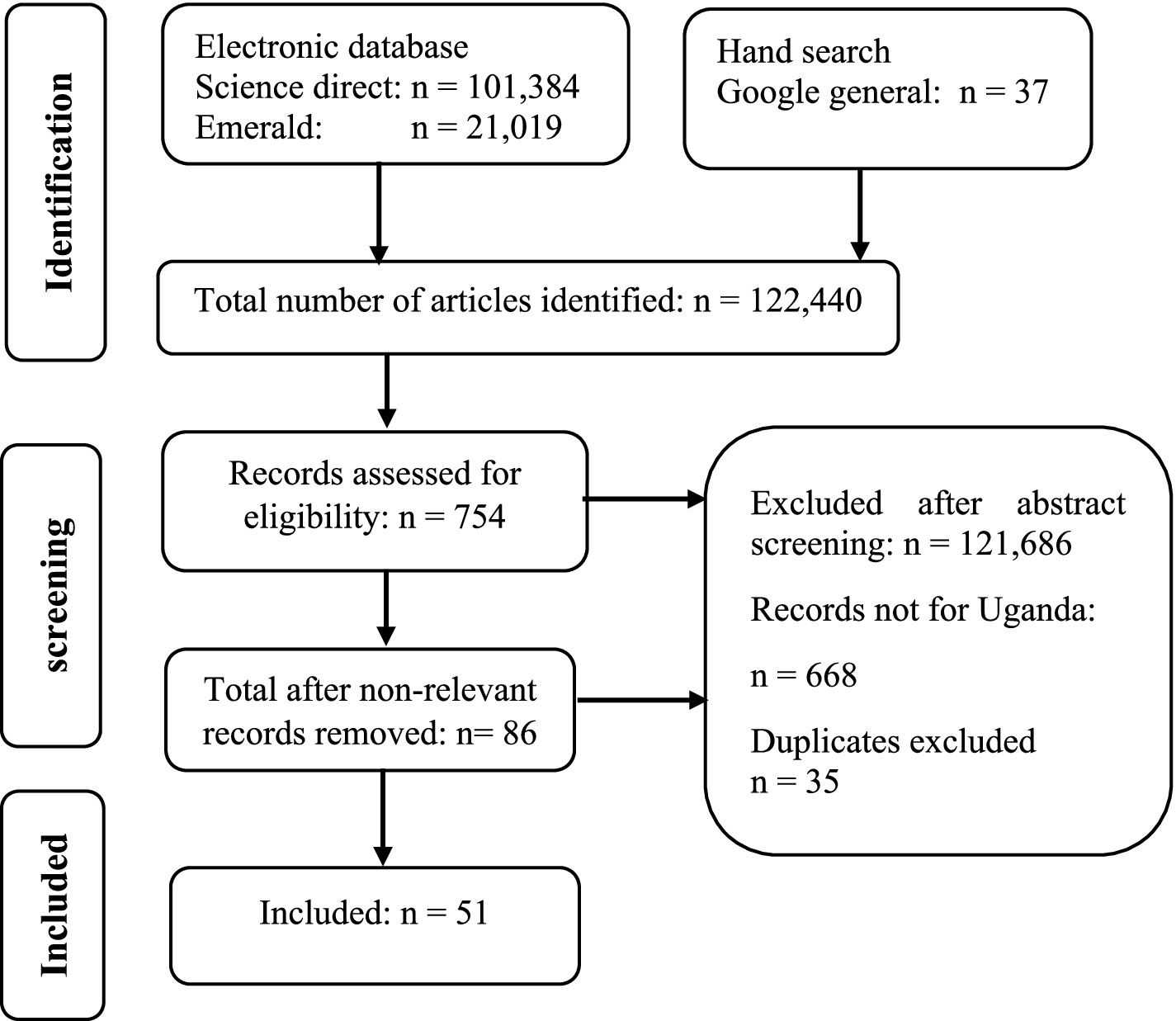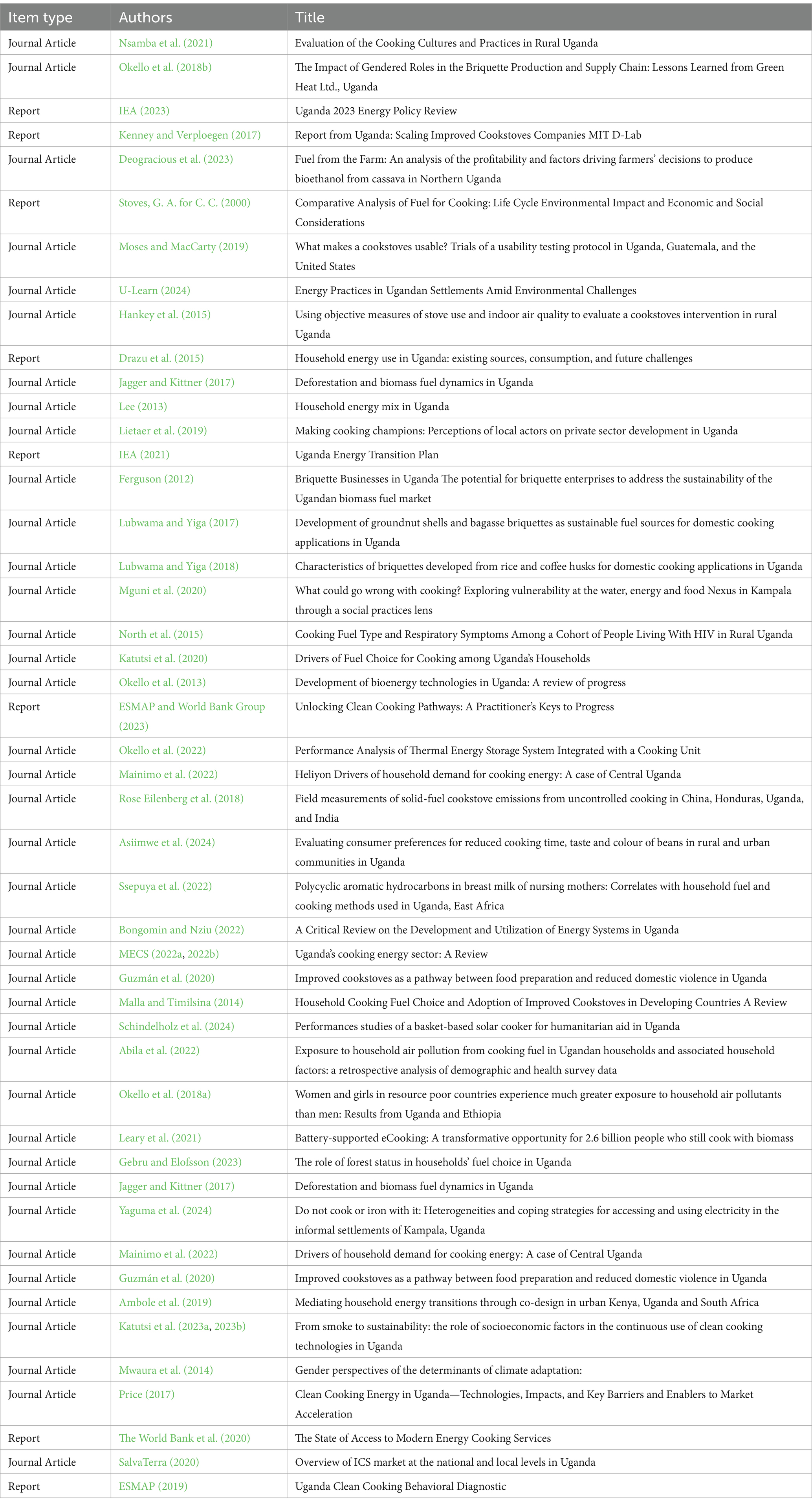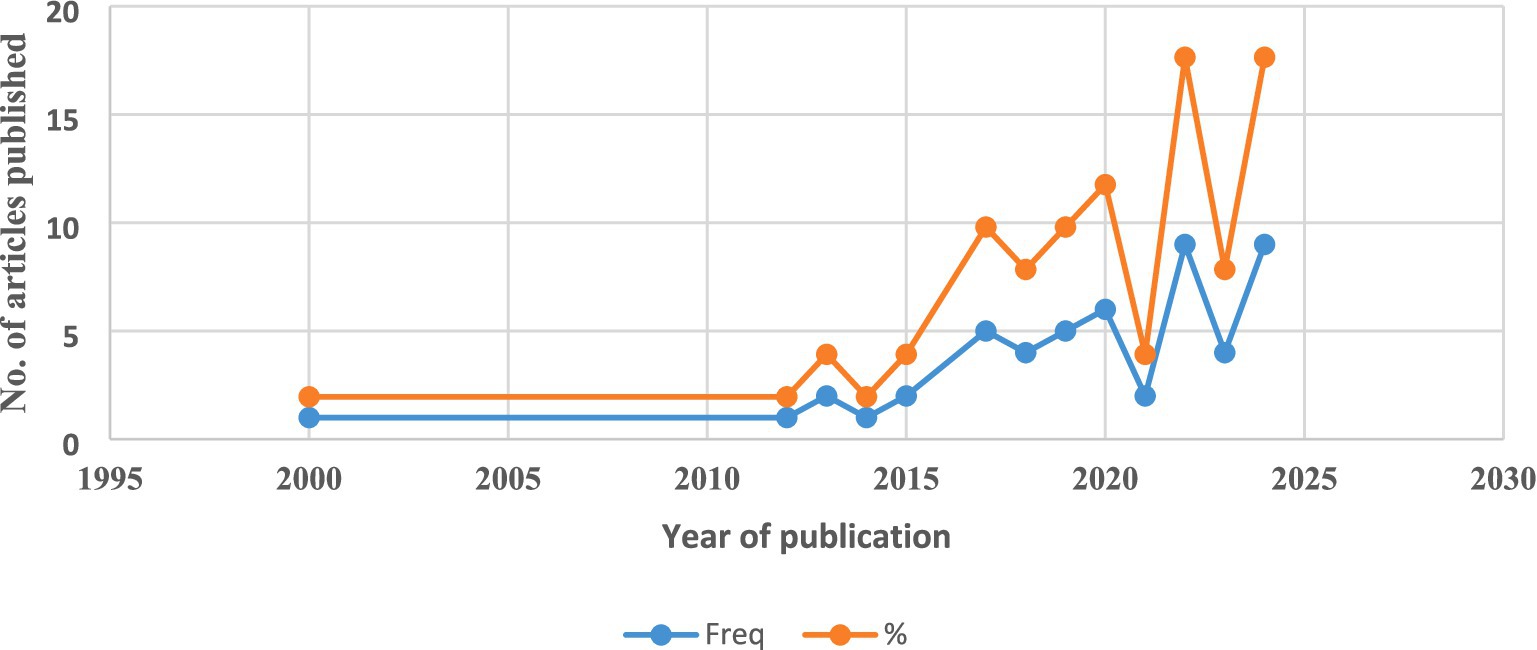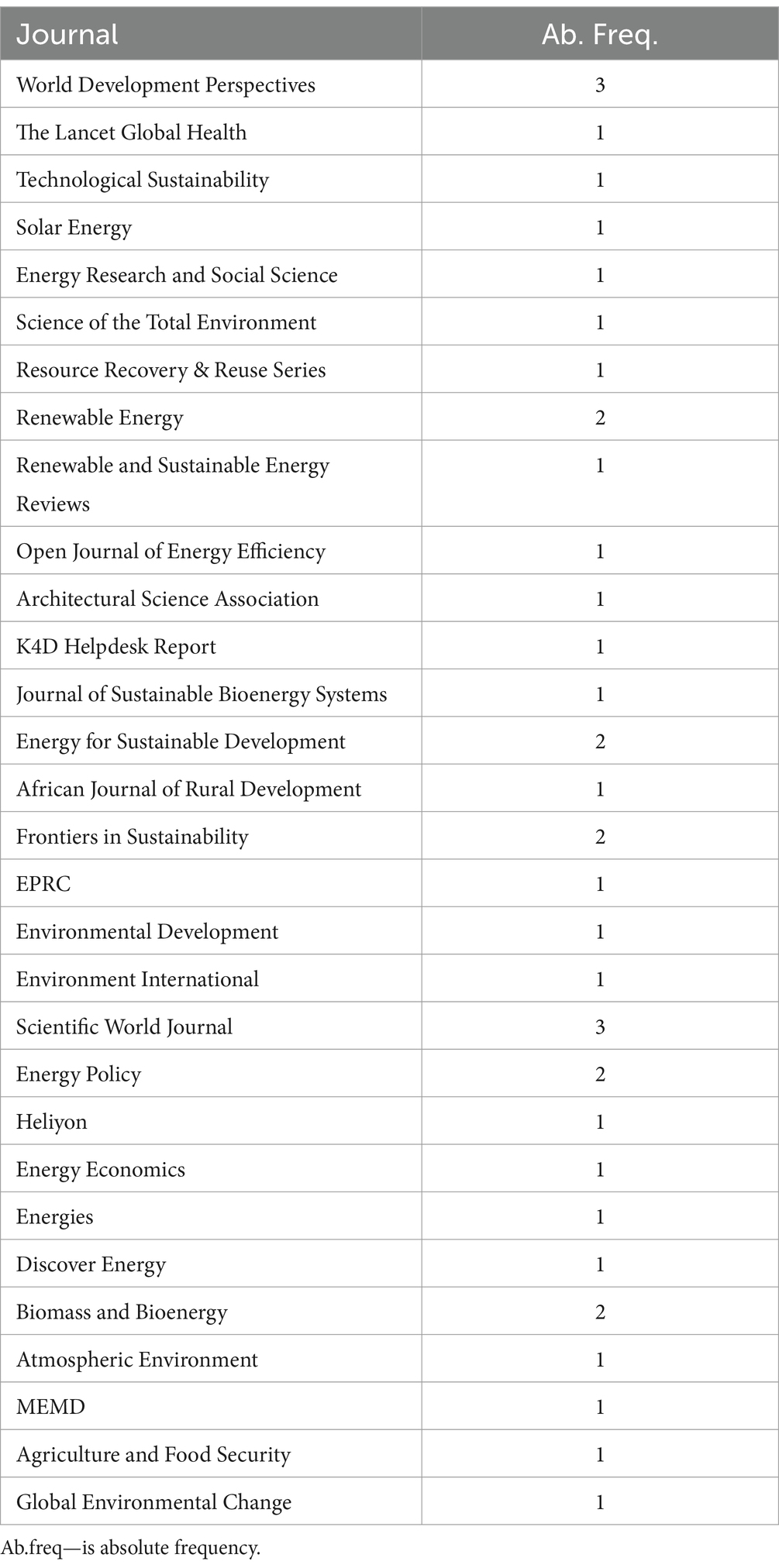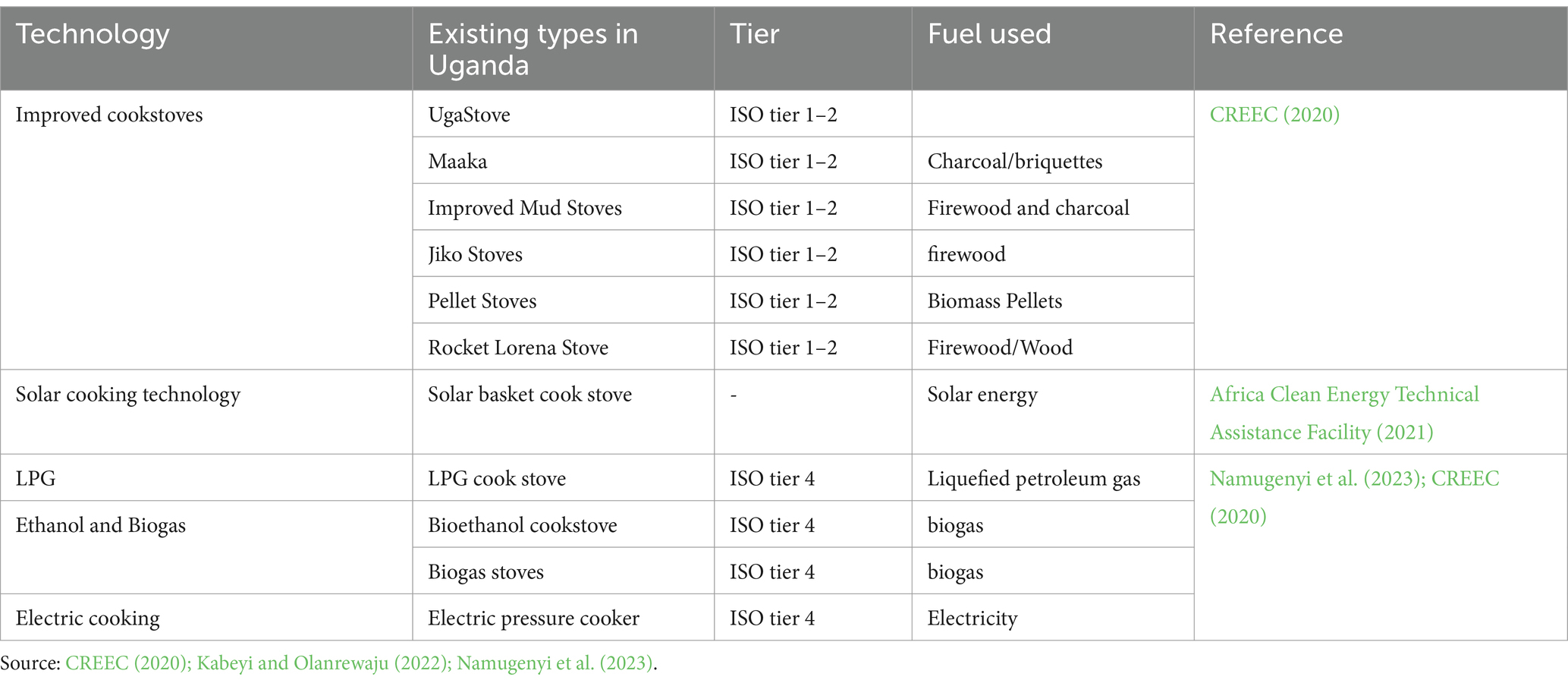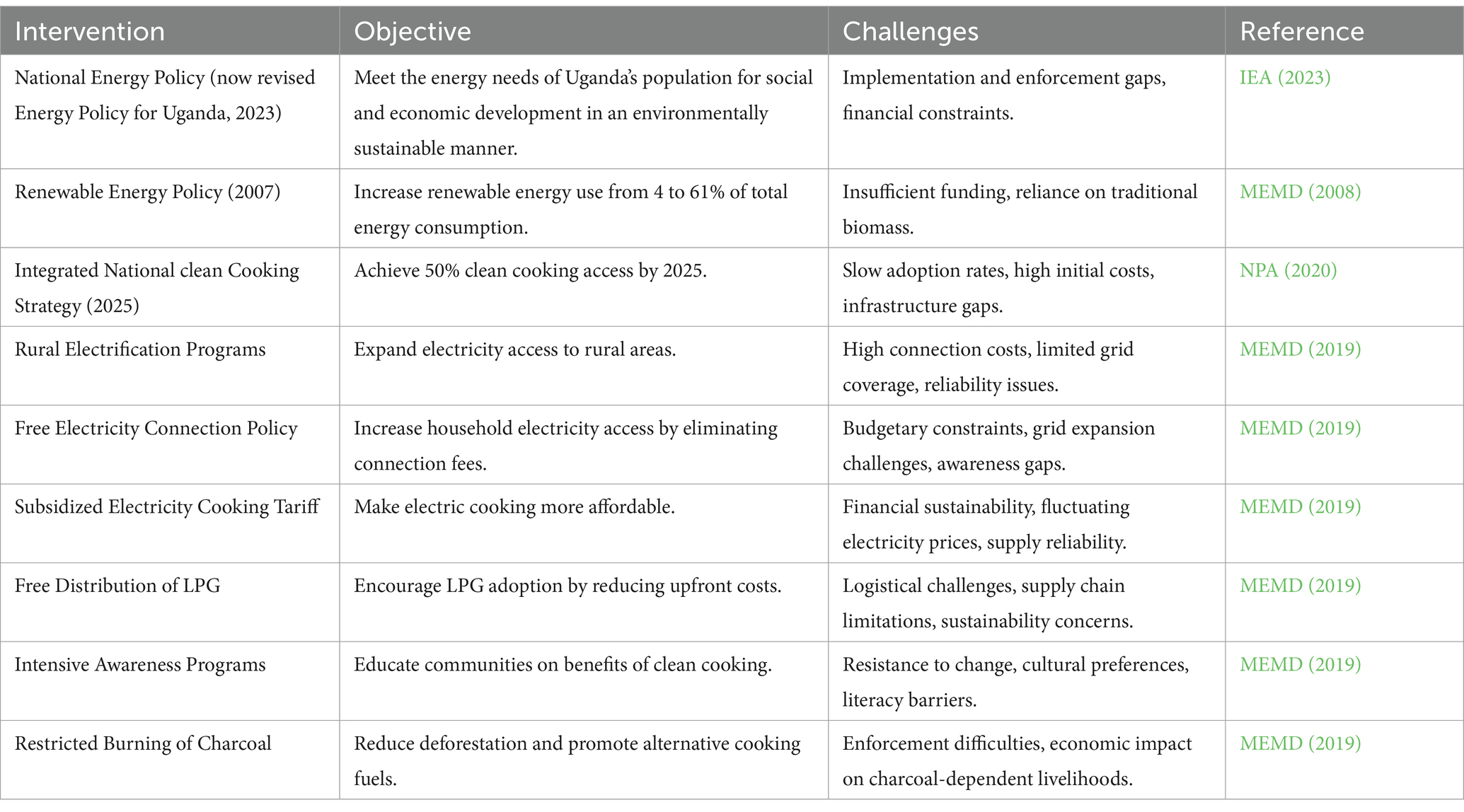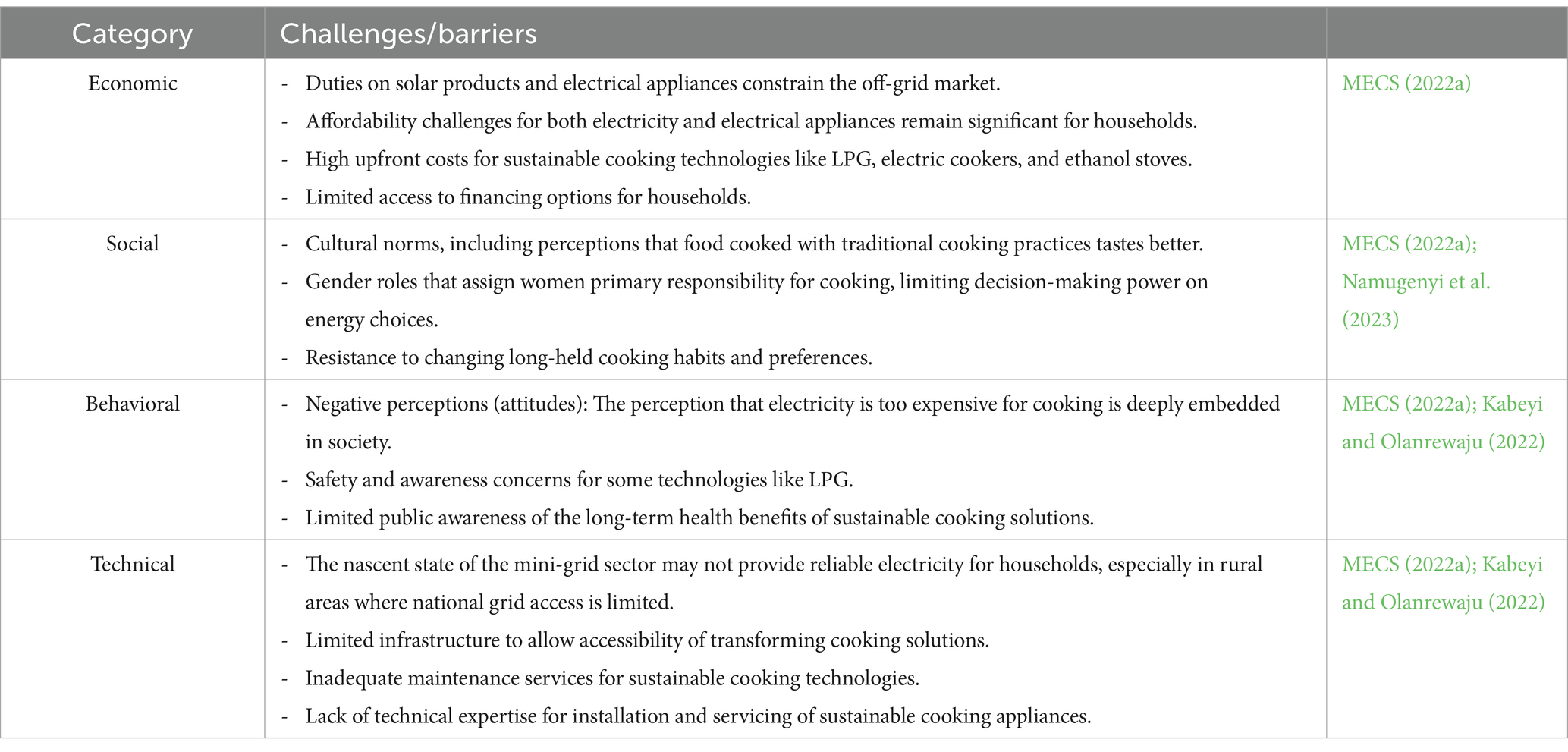- 1Faculty of Economics, Energy and Management Sciences, Makerere University Business School, Kampala, Uganda
- 2Faculty of Commerce, Makerere University Business School, Kampala, Uganda
- 3Faculty of Environmental Sciences and Natural Resource Management, Norwegian University of Life Sciences, Ås, Norway
Cooking in Uganda is deeply rooted in cultural traditions, influencing the choice of cooking solutions across different regions. This study aims to map clean cooking practices, identify key interventions, and highlight challenges hindering their widespread adoption and sustained use. A systematic literature review, guided by the PRISMA approach, was employed to ensure a rigorous and transparent selection of scholarly sources. Findings reveal that traditional biomass, mainly firewood and charcoal, continues to dominate Uganda’s cooking landscape, while modern alternatives like LPG, ethanol, and electric cooking remain underutilized due to cultural preferences, affordability constraints, and infrastructure limitations. To address these challenges, the study recommends targeted subsidies, Pay-As-You-Go financing models, and tax exemptions to reduce initial costs. Additionally, regulatory interventions should stabilize fuel prices, expand fuel distribution networks, and invest in rural electrification via solar mini-grids. Integrating electric cooking into Uganda’s broader renewable energy and climate policies would further support widespread adoption and contribute to sustainability goals.
1 Background to the study
Cooking practices in Uganda are deeply intertwined with cultural traditions, food preferences, and social norms, more so in rural areas which are normally densely populated (Nsamba et al., 2021). Cooking in Uganda is not just a functional activity; it is a cultural expression that varies across different regions often influenced by food types and traditions. These practices are deeply entrenched in the cultural and moral fabric of the communities (Nsamba et al., 2021; Ogalo, 2024). Traditionally to prepare most of the Ugandan dishes such as matooke, beans and maize meals (posho) long cooking times over an open flame, and many of these cooking practices have been passed down through generations (CREEC, 2020). The open fires though are most preferred for cooking the dishes not only because of the availability but because they are thought to enhance the taste of the food (CREEC, 2020; Hellwig et al., 2022).
Unfortunately, over time, this reliance on traditional cooking methods has contributed to a range of challenges, including indoor air contamination, respirational difficulties, and deforestation (Puzzolo et al., 2024). The World Health Organization (WHO) estimates that indoor air pollution from traditional stoves and open fires contributes to millions of premature deaths globally, particularly among females and girls who spend the most time near cooking fires (World Health Organisation, 2023). In Uganda, the heavy dependence on firewood has led to widespread deforestation, resulting in depletion of natural resources and contributing to climate change (Nuwagira et al., 2022). As the country continues to urbanize and its population grows, these challenges are becoming more pronounced, calling for transition toward clean energy solutions for cooking.
The increasing cognizance of ecological and health impacts concomitant with traditional cooking methods and fuels used has spurred the need to explore clean cooking energy solutions (Nuwagira et al., 2022). The Ugandan government, in collaboration with international organizations and private sector actors, has implemented several programs to promote clean cooking (MECS, 2022b). For example, the National eCooking Strategy aims to integrate electric cooking into the country’s energy planning, while programs like the Modern Energy Cooking Services (MECS) initiative focus on scaling up innovative cooking technologies (MECS, 2022b). These efforts include reducing taxes on clean cooking appliances, developing financing mechanisms to improve affordability, and launching awareness campaigns to educate communities about the benefits of clean cooking practices (MECS, 2022b). As it stands now, Uganda’s energy landscape presents a unique opportunity for transitioning to clean cooking practices. The country has made significant investments in renewable energy, with its electricity grid primarily powered by hydro power (IEA, 2023). This renewable energy potential, coupled with surplus electricity generation, positions Uganda to scale up electric cooking solutions.
Despite the initiatives in favor of clean cooking practices adoption, few households have adopted such solutions. This low adoption rates are attributed to challenges such as infrastructural limitations, inconsistent electricity supply in some regions, and behavioral barriers, such as resistance to change and a lack of trust in new technologies (Katutsi et al., 2020). Previous research on cooking energy transitions has explored the technical feasibility, socio-economic impacts, and behavioral drivers of adopting clean cooking solutions. However, these studies often focus on specific regions, technologies, or interventions without providing a comprehensive overview of the systemic factors influencing the transition. For example, MECS review explored the adoption of modern energy-efficient cooking appliances like Electric Pressure Cookers (EPCs) in Uganda (MECS, 2022b). These studies highlight the compatibility of electricity pressure cooker with traditional Ugandan cooking practices, the energy-saving potential, and barriers to adoption, such as high costs and limited awareness (MECS, 2022b). These studies have provided useful insights but focus primarily on pilot interventions and their immediate outcomes, rather than offering a broader synthesis of the literature.
The transition toward clean cooking technologies in Uganda has gained attention in recent years, with various stakeholders; governments, non-governmental organizations (NGOs), and international development agencies working to promote clean cookstoves and alternative fuels such as liquefied petroleum gas (LPG), solar cookers, and biogas (CREEC, 2020; Katutsi et al., 2023a, 2023b). However, the adoption of these technologies has been slower than anticipated (UBOS, 2022). A significant body of literature has pointed to several barriers to the widespread use of clean cooking technologies, including cultural factors, cost considerations, and the perceived incompatibility of new technologies with traditional cooking practices (UOMA, 2021; CREEC, 2020).
One of the significant barriers to clean or modern cooking practices in Uganda is the influence of cultural norms and food preferences on cooking behavior (Asiimwe et al., 2024). Food preparation in Uganda is often a communal activity involving large meals cooked over extended periods, with a strong cultural belief that food cooked over an open flame, particularly staples like beans, stews, and maize porridge, tastes better. This preference for firewood and charcoal as primary fuels is deeply ingrained, making the shift to modern cooking technologies feel like a disruption to traditional practices and a threat to cultural identity. Additionally, gender norms play a crucial role in shaping cooking practices, as women, who are primarily responsible for household cooking, are key agents in the adoption of new technologies. Notwithstanding (Katutsi et al., 2023a, 2023b) various individual studies have provided data on modern cooking technologies in Uganda, there is a lack of a systematic review that consolidates these findings to offer a broader understanding of trends, challenges, and future directions.
Elsewhere, the study conducted by Lindgren (2020) on sustainable cooking practices, focusing on behavior, stakeholder engagement, and the global diffusion of improved cookstoves, presents a key limitation in its scope and context. Since the review adopts a global perspective, it may overlook region-specific socio-economic, cultural, and policy factors unique to Uganda. Cooking practices are highly contextual, influenced by local traditions, fuel availability, gender roles, and energy access infrastructure. Uganda’s household energy dynamics, including reliance on biomass, varying levels of policy support for clean cooking technologies, and socio-cultural norms surrounding cooking roles, differ significantly from global averages or contexts examined in the review.
Similarly, the study conducted by ESCAP (2021) on the impacts of clean and improved cooking interventions on adoption outcomes and health impacts has a key limitation in its broad regional focus and methodological diversity. The data analyzed in the review aggregates findings from multiple countries with varying socio-economic conditions, and cultural cooking practices. This wide scope may obscure important contextual differences that are critical in understanding adoption dynamics in specific regions like Uganda. A systematic literature review on clean cooking practices in Uganda is necessary because existing studies, such as Lindgren (2020) and ESCAP (2021), adopt global and broad regional perspectives that fail to capture Uganda’s unique socio-cultural, economic, and policy contexts. Cooking practices are deeply influenced by local factors, and understanding these nuances is essential for effective policy design and intervention strategies.
2 Methodology
The existing scholarly works in transformative cooking practices was identified, evaluated and synthesized using a Systematic literature review methodology. Systematic literature review was chosen because it is a rigorous and replicable methodology that provides a transparent approach to the selection and inclusion of scholarly literature to answer a well predefined question or sub-questions (Moher et al., 2009; Page et al., 2021) based on preferred reporting items for systematic reviews and meta-analysis (PRISMA) approach. This study adopted the protocol suggested by Liberati et al. (2009) and Moher et al. (2009) for conducting systematic literature reviews.
2.1 Formulating research questions
As mentioned earlier, systematic literature reviews focus on answering specific questions. For this particular study, the review attempts to answer the following sub-questions:
1. What is the current cooking landscape in Uganda?
2. What clean cooking practices are being adopted for use in Ugandan households and institutions?
3. What interventions are put in place to promote clean cooking practices in Uganda?
4. What are the main challenges to the adoption and use of the existing clean cooking interventions in Uganda?
2.2 Sources of articles and grey literature
The identification of relevant scholarly articles and grey literature was conducted through a systematic search across multiple search engines, academic databases, and peer-reviewed journals. The articles and reports included in this review were sourced from science direct data base and emerald publishers. These sources were selected due to their extensive repository of peer-reviewed publications spanning diverse disciplines, particularly in energy and environmental sciences, which are critical for research on clean energy solutions. Additionally, Google Scholar and general Google searches were employed to supplement the search for relevant literature (grey literature). The selection of peer-reviewed journals was guided by impact metrics, including impact factor and the ABDC journal ranking system. Journals with an impact factor and Cite Score of at least 2.0 were considered, alongside those ranked A, B, or C in the ABDC classification. Articles published in journals meeting these criteria were deemed suitable for inclusion in this study.
2.3 Search strategy
2.3.1 Search terms and strings
To ensure the retrieval of relevant materials from the databases and journals identified in subsection 2.2, a structured search strategy was employed. This approach utilized specific search terms, keyword strings, and Boolean operators to refine and optimize the search process. The following search parameters were applied:
“Choice of cooking technology” OR;
“Choice cooking fuel” OR
“Barriers to transformative cooking practices” OR
“Challenges of adoption cooking fuel” OR
“Adoption of sustainable cooking”
2.3.2 Inclusion and exclusion strategy
The following criteria was used to include and exclude articles in this study (Table 1).
2.4 Material collection
The final search for published journal articles and grey literature was conducted on November 26, 2024. Each search term was entered separately into Science Direct and Emerald, with the results documented individually, as summarized in Table 2. The electronic search yielded a total of 122,440 documents, comprising 101,384 from Science Direct and 21,019 from Emerald, while an additional 37 documents were manually retrieved from Google general. The identified documents underwent an initial screening based on titles and abstracts, resulting in the exclusion of 121,686 records. A subsequent eligibility assessment was performed, leading to the inclusion of 51 documents in the study. These selected articles and reports (see Figure 1) were then synthesized to address the research questions outlined in Section 2.1.
2.5 Data charting
Excel sheet was used for data charting. Records that met the criteria were entered into an excel sheet to capture captured the year, author, journals, in addition to information derived from the questions. Subsequently, first section of analysis (descriptive analysis was done using the excel sheet).
3 Findings
3.1 Descriptive analysis
This section presents the synthesis of the 51 records included in this study (see Table 3 summary of journal articles and reports). The findings are summarized in tables and figures along different dimensions for easy presentation and interpretation.
3.1.1 Year wise distribution of articles and reports
The annual numerical analysis of the 51 articles included in the dataset is shown in Figure 2. From the analysis, results show that the most of the papers (18) included in the analysis were published in 2022 and 2024 with each year generating nine (9) records. A significant number of the papers (6) were published in 2020. The remaining 18 paper were published between 2000 and 2019 with only one paper published in the year 2000.
The growing body of literature on cooking solutions, as evidenced by studies such as Nsamba et al. (2021), Kenney and Verploegen (2017), Deogracious et al. (2023), and Lubwama and Yiga (2018), reflects increasing recognition of the inefficiencies and health risks associated with traditional cooking technologies, such as the three-stone fire. These unclean cooking methods are characterized by high emissions, which have been linked to adverse health outcomes among household occupants.
3.1.2 Data sources
The data (articles and reports) synthesized were obtained from different journals and reputable organizations including ministries and agencies. Table 4 lists different journals and reputable organizations from which different journal articles and reports were published. World Development Perspectives and Scientific World Journal were the leading publishers with each publishing three articles included in this review. Significant number of journals including; Frontiers in Sustainability, Energy Policy, Biomass and Bioenergy Energy for Sustainable Development and Renewable Energy journals published at least two papers each.
The rest of the journals and reputable organizations and agencies as shown in Table 4 published at least one paper or report each. The increased number of journals publishing in the area of clean cooking technologies and fuels shows the importance of clean cooking sector in addressing challenges not only affecting households and institutions where cooking is done but also the environment and climate change as well.
3.2 Synthesis
This section presents the synthesis based on the main questions guiding the review as below.
3.2.1 Overview of Uganda’s clean cooking landscape
The government of Uganda defines clean cooking within the framework of its National Development Plan (NDP III) and clean Energy for All (SEforALL) Action Agenda, which emphasize the transition to efficient and low-emission cooking solutions (MEMD, 2023). The government aims to achieve 50% clean cooking access by 2030, in line with global targets for Sustainable Development Goal 7 (SDG 7), which seeks universal access to affordable, reliable, and modern energy (IEA, 2023; MEMD, 2023). Overall, clean cooking in Uganda is defined by the efficiency, safety, and environmental sustainability of the technologies and fuels used, as well as the ability to improve public health and reduce the strain on natural resources (MEMD, 2023). Uganda’s energy sector remains predominantly reliant on biomass, with only 0.6% of households adopting clean and sustainable cooking solutions in 2023. This figure increased slightly to 3.8% in 2024 (UBoS, 2024).
Uganda’s clean cooking sector is growing rather slowly with only about 10% of the population adopting clean cooking energy (IEA, 2023). In Uganda’s context, clean cooking is defined to include the use of liquefied petroleum gas, electricity, natural gas, improved cook stoves, solar cooking baskets, Ethanol and Biogas and Pellets and Briquettes (MECS, 2022b). Biomass is any organic matter that is available on a renewable basis mainly through photosynthesis. In the energy context, biomass means products consisting of any whole or part of a vegetable matter from agriculture or forestry, which can be used as a fuel for the purpose of recovering its energy content. Biomass includes firewood, charcoal shrubs, grasses, forest wastes and agro-industrial residues including animal wastes. Bioenergy in the form of biomass and biogas is the most consumed energy source in Uganda, accounting up to more than 87% countries total energy consumption with about 73% of the households using biomass directly as firewood while 21% use charcoal (UBOS, 2022).
Biomass includes firewood, charcoal shrubs, grasses, forest wastes and agro-industrial residues. Uganda’s biomass energy potential is 1,800 MW. Bioenergy in the form of biomass and biogas is the most consumed energy source in Uganda, accounting up to more than 87% countries total energy consumption with about 73% of the households using biomass directly as firewood while 21% use charcoal (UBOS, 2022). Several private companies, including SolarNow, Fenix International, d.light, and BrightLife, offer affordable solar home systems on a pay-as-you-go (PAYG) are making solar solutions more available and accessible to low-income households (Africa Clean Energy Technical Assistance Facility, 2021). These systems provide basic lighting, phone charging, and power for small appliances. The access rate to clean cooking technologies in Uganda remains significantly low.
Uganda’s PAYG market is one of the largest in Africa, allowing households to adopt solar without upfront costs (International Finance Corporation, 2019). PAYG model have increased access to clean energy by offering flexible payment plans, normally using mobile money. Solar-powered mini-grids are being developed in areas where grid expansion is not viable (International Finance Corporation, 2019). The mini-grids provide reliable electricity for households, businesses, and community services (EEP Africa, 2018). Initiatives such as the Uganda Green Power project and partnerships with private firms have increased the use of solar mini-grids (EEP Africa, 2018). Several international partners, such as the World Bank, are providing funding and technical support for mini-grid development, especially in northern Uganda and other remote regions (SE for ALL and African Development Bank, 2018). These developments provide glaring opportunities for households to transition to clean cooking practices. Regional disparities exist in access to clean cooking technologies and fuels, with only the central region demonstrating significant improvements in clean cooking adoption (see Figure 3).

Figure 3. Regional consumption of different cooking fuel categories in Uganda. Source: authors computation using UBoS data 2024.
3.2.2 Clean cooking practices in Ugandan households and institutions
Clean cooking practices include all those cooking technologies and subsequent fuels that are less polluting and efficient methods compared to the traditional polluting cooking methods such as open fires and rudimentary stoves fueled by firewood, charcoal, or kerosene (see Table 5). The transition to modern clean (transforming) is crucial for improving health, preserving the environment, and enhancing economic and social well-being (Swain and Mishra, 2021). In this review, the following cooking technologies were identified.
3.2.3 Interventions to promote the use of clean cooking practices in Uganda
From the literature synthesis, policy interventions have been put in place to promote the use of clean cooking practices. Such policy initiatives are included in Table 6 below.
3.2.4 Challenges to adoption and sustained use of clean cooking solutions in Uganda
Several challenges have been identified as a cumbrance to clean cooking practices in Uganda as listed in Table 7.
4 Discussion
4.1 Clean cooking practices in Ugandan households and institutions
The main aim of this paper was to provide a synthesis of literature on cooking practices in Uganda with the main focus on the transforming cooking practices for households and institutions in Uganda.
4.2 Clean cooking practices in Uganda
Conceptually, transforming cooking practices in Uganda just like any other developing parts of the world, refer to the transitioning to sustainable, healthier and more cleaner cooking practices (Katutsi et al., 2020). In Uganda, the focus is to shift from traditional way of using firewood and other forest based energy resources to more efficient technologies for cooking. Transforming cooking practices include all those cooking technologies and subsequent fuels that are less polluting and efficient methods compared to the traditional polluting cooking methods—such as open fires and rudimentary stoves fueled by firewood, charcoal, or kerosene (Leary et al., 2021; MECS, 2023; Stevens et al., 2020; WorldBank, 2021). The transition to modern clean (transforming) is crucial for improving health, preserving the environment, and enhancing economic and social well-being. In this review, the following cooking technologies were identified (Leary et al., 2021; MECS, 2023). In Uganda, it is important to note that transforming cooking practices is conceptualized as a multifaceted phenomenon whose focus is to address health, environment sustainability, gender equality and socio-economic development. In this study, several transforming cooking practices and the subsequent technologies have been identified and they include the following;
4.2.1 Use of improved cookstoves
The study identifies several types of improved cookstoves that are currently being promoted and used for cooking in Uganda. Such improved cookstoves include UgaStove, Maaka, Improved Mud Stoves, Jiko Stoves, Pellet Stoves, Rocket Lorena Stove, and Solar Basket Cook Stoves. Most of the improved cookstoves used in Uganda are locally made using available materials. Improved cookstoves are predominantly adopted and used in urban areas, while rural areas largely continue using the traditional “three-stone cook” stoves (Mainimo et al., 2022). Improved cookstoves are designed to use firewood or charcoal more efficiently, reducing fuel consumption by 24.6% compared to traditional three-stone fires (Hafner et al., 2020). This saves households’ money and reduces the time spent collecting firewood, particularly for women and children (Hafner et al., 2020).
While the use of improved cookstoves in Uganda represents a significant step in addressing the health, socio-economic, and environmental challenges associated with traditional fuel use, a majority of households and institutions such as schools continue to rely heavily on traditional firewood consumption. This dependence has heightened the rate at which forest cover is being depleted in the country (Egeru, 2014). Several challenges hinder the widespread adoption of improved cookstoves in Uganda. One of the major barriers is the high upfront cost of acquiring improved cookstoves. Many low-income households cannot afford the initial purchase price, despite the long-term savings in fuel costs. Additionally, limited awareness and cultural resistance to new cooking technologies pose significant challenges. Many communities, particularly in rural areas, are unfamiliar with the benefits of improved cookstoves and remain skeptical about their effectiveness compared to traditional methods.
Another critical challenge is the lack of a well-developed supply chain and distribution network, making it difficult for rural households to access improved cookstoves (Stevens et al., 2020). Many of these stoves are available mainly in urban areas, leaving rural communities with limited or no access. Furthermore, inconsistent quality and durability of locally manufactured stoves affect user confidence. Some locally made stoves do not meet efficiency standards, leading to dissatisfaction and reluctance to transition from traditional cooking methods. While improved cookstoves reduce fuel consumption, they still require firewood or charcoal, which can be costly or difficult to access in some regions. In areas facing high fuel prices or shortages, households may revert to traditional three-stone fires, which use freely available biomass (Chindarkar et al., 2021). Additionally, insufficient government support and policy enforcement have limited the scale-up of improved cookstoves programs. Although various initiatives promote clean cooking technologies, their implementation has been fragmented, and financial incentives remain inadequate to drive large-scale adoption (Boudewijns et al., 2022).
4.2.2 Solar cooking technology
Solar cooking technology is one of the merging clean and environmentally friendly cooking solution (see Figures 4a,b) capable of addressing cooking energy needs in Uganda (Schindelholz et al., 2024). The technology harnesses solar energy to cook food, heat water, and sterilize equipment, reducing reliance on traditional biomass fuels like firewood and charcoal (Schindelholz et al., 2024). The common types of solar cooking technologies under trial in Uganda include; Solar Box Cookers, Parabolic Solar Cookers, Panel Solar Cookers, and Solar Electric Cookers (Schindelholz et al., 2024). The Solar Box Cookers are made up of insulated containers with reflective surfaces to concentrate sunlight onto the cooking area. They are normally used for cooking dishes and or baking that take time (Schindelholz et al., 2024).
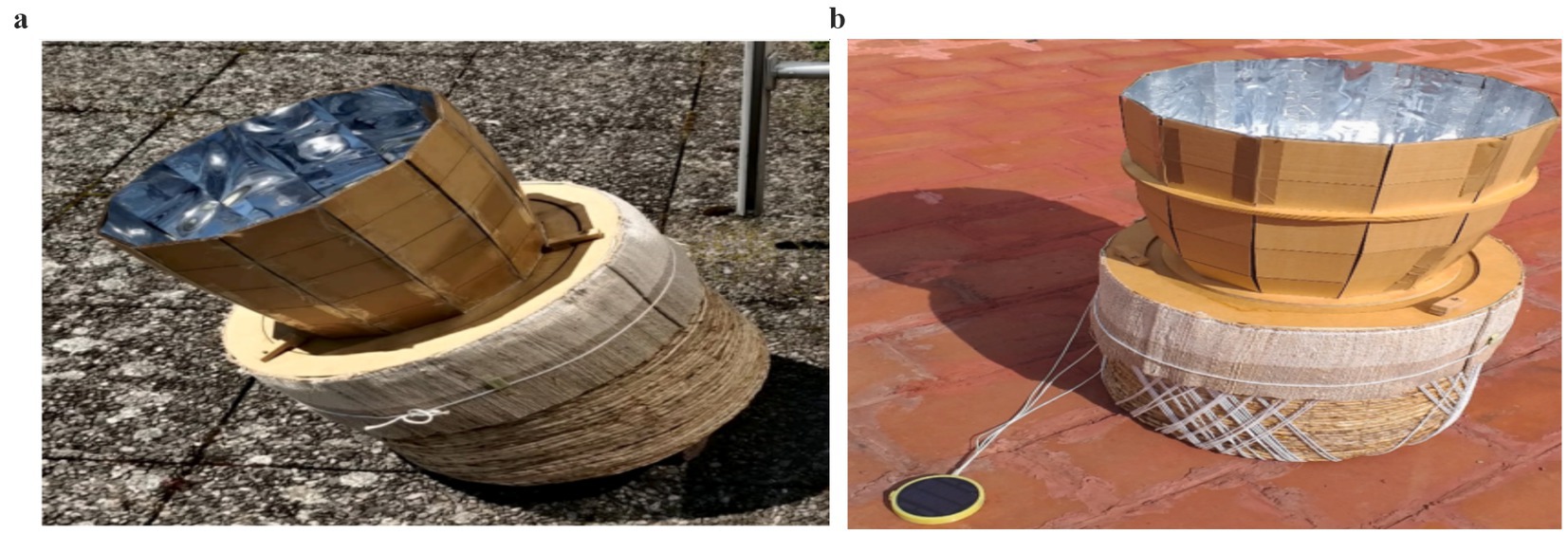
Figure 4. (a) Basket cooker with a 30° inclination to simulate solar radiation (Schindelholz et al., 2024). (b) Setup of the basket cooker on the rooftop (Schindelholz et al., 2024).
4.2.3 LPG for cooking in Uganda
Under the Draft Energy Policy of 2019, Liquefied Petroleum Gas (LPG) is considered the key option for clean cooking, with the Government of Uganda undertaking to promote access to LPG energy services (Nakanwagi, 2021). The policy aims to assist the government in meeting its obligations under the 2015 Paris Agreement and the Sustainable Development Goals (SDGs) on access to modern and affordable energy sources and climate mitigation and adaptation (Nakanwagi, 2021). Further, the country aims to cut down its aggregate national greenhouse gas emissions by approximately 22% by 2030 (Nakanwagi, 2021).
Although Uganda’s LPG market remains relatively low compared to neighboring countries, there are promising signs of growth, especially with the government’s commitment to ensuring the adoption and use of clean fuels for cooking as of 2018, LPG consumption, especially for cooking, increased by 13.4%. Among the limited proportion of households utilizing clean cooking fuels, liquefied petroleum gas (LPG) was the predominant choice, comprising 70% of clean fuel users as of 2021 (Nakanwagi, 2021). Despite the growth potential, the low levels of adoption and use of LPG highlight the limited penetration of LPG in Uganda, where a majority of the population still relies on traditional firewood for cooking (Nakanwagi, 2021). One of the primary challenges to adoption is the high initial cost of LPG equipment, including cylinders, stoves, and accessories. For many low-income households, the upfront investment required to transition from traditional biomass to LPG is unaffordable, limiting widespread adoption (Nakanwagi, 2021).
The limited distribution network, particularly in rural areas is yet another barrier affecting the adoption of LPG in rural communities. Many communities do not have easy access to LPG refilling stations, forcing users to travel long distances to refill their cylinders. This lack of infrastructure makes LPG less convenient compared to firewood or charcoal, which are readily available in local markets or forests. Additionally, affordability concerns persist due to price fluctuations, as LPG prices are subject to changes in global oil markets, making it a less predictable and reliable energy source for households with irregular incomes (Choudhuri and Desai, 2020).
Awareness and cultural perceptions also play a significant role in hindering LPG adoption. Many households, especially in rural settings, lack information on the benefits of LPG or perceive it as unsafe due to the risk of explosions or gas leaks (Hassan and Wood, 2020). These concerns, often fueled by misinformation, contribute to hesitation in adopting LPG as a primary cooking fuel. Furthermore, while the government has introduced incentives such as tax reductions and subsidies, their implementation has been inconsistent, limiting their effectiveness in making LPG more accessible to the broader population (Hassan and Wood, 2020).
4.2.4 Ethanol for cooking
Ethanol is a widely used liquid biofuel, primarily employed in the transportation and industrial sectors. Since its initial production in the 1970s in Brazil and the United States, ethanol has gained prominence as an alternative to fossil fuels, which are associated with high greenhouse gas emissions (Nakamya and Romstad, 2020). Ethanol combustion produces minimal fumes and soot, making it a healthier cooking fuel compared to biomass (IEA, 2023). Additionally, ethanol is more cost-effective than charcoal. In Uganda, ethanol is predominantly derived from cassava, sugarcane, sweet sorghum, and municipal waste, making it a cleaner fuel alternative to biomass (IEA, 2023). While ethanol use for cooking in Uganda remains in its early stages, the government is actively promoting its adoption and is reportedly engaging with international developers on related projects.
Ethanol is produced from sugar-rich feedstocks such as sugarcane, sugar beet, and molasses, as well as starch-based crops like maize, cassava, banana, and sweet sorghum (Nakamya and Romstad, 2020). Although Uganda’s biofuels sector is still emerging, some companies have already established ethanol production capacity. Kakira Sugar Works Limited (KSWL) in Jinja and the Sugar Corporation of Uganda Limited (SCOUL) in Lugazi have installed capacities of 35,000 liters and 60,000 liters of molasses-based ethanol per day, respectively (Nakamya and Romstad, 2020). Additionally, SCOUL also utilizes maize for ethanol production. Uganda’s strong sugar industry provides a steady supply of raw materials for ethanol production. Research on ethanol as a cooking fuel has been conducted, national standards for denatured ethanol are in place, and the government has invested in Bukona Agro Distillery, which has a production capacity of 40,000 liters (IEA, 2023). However, despite the sector’s potential, slow investment and delays in commercial ethanol production have been attributed to the lack of a clear regulatory framework and inadequate policy incentives (Nakamya and Romstad, 2020).
Ethanol production has implications for food security, particularly when staple crops such as maize, cassava, and sugarcane are used as feedstock. Increased demand for these crops for biofuel production can lead to higher food prices, reduced availability for human consumption, and competition for agricultural land, exacerbating food insecurity, especially among vulnerable populations (FAO, 2021). In Uganda, where cassava and maize serve as staple foods, large-scale ethanol production could divert these critical food resources toward energy generation, potentially affecting nutrition and household food access (Nakamya and Romstad, 2020). Additionally, allocating land for biofuel feedstock may reduce space for food production, further intensifying food security concerns. A balanced approach that prioritizes both food security and sustainable biofuel production is necessary. Utilizing agricultural residues, such as molasses from sugar processing, or non-food feedstocks could help mitigate these risks while ensuring both energy and food security (IEA, 2023).
4.2.5 Electric cooking
According to the report of MECS (2022a, 2022b), eCooking (electric cooking) remains in its early stages of development relative to other evolving cooking solutions, such as improved cookstoves and liquefied petroleum gas (LPG). In urban areas, particularly in Kampala, the majority of households have access to the national electricity grid. Unfortunately, most of the households primarily use electricity for lighting and ironing only due to limited access to a reliable and affordable electricity grid, which restricts usage to basic needs when electricity is available. High costs, an unreliable supply, and insufficient infrastructure force most households to rely on alternative energy sources such as firewood and kerosene for cooking and other energy needs (CREEC, 2020; Wabukala et al., 2022; Yaguma et al., 2024). Electric cooking is well recognized in the third national development plan (NDPIII) as a critical path to reduce the dominance of biomass as a cooking fuel. The emphasis is to increase the demand for the surplus electricity generated in the country (NPA, 2020). In the draft national energy policy (2019), ecooking is recognized as a diversification mechanism to help liberate the biomass based cooking sector in Uganda (Bisaga, 2021; CREEC, 2020; Puzzolo et al., 2020).
Electric cooking is ideal for cooking developing countries like Uganda as it reduces indoor air pollution, improving health, especially for women and children, while also curbing deforestation and carbon emissions (Yorke, 2024). It promotes energy efficiency, and empowers women by saving time spent on fuel collection and cooking (Yorke, 2024). Electric cooking supports rural electrification, creates jobs, and aligns with global sustainability goals, despite challenges like appliance costs and electricity reliability that must be addressed for widespread adoption (MEP, 2024).
5 Conclusion
This systematic literature review sought to explore Uganda’s cooking land scape, identify the clean cooking practices being adopted for use in households and institutions, and the main challenges to the adoption and sustained use of clean cooking solutions. The findings highlight that Uganda’s cooking land scape is still largely dominated by traditional biomass in the form of firewood and charcoal. Clean cooking solutions such as LPG, ethanol, and electric cooking technologies have been introduced, but their use among households remains very low due to cultural preferences, affordability issues, and infrastructure limitations. By transitioning to clean cooking practices, the risk of respiratory infections and chronic health conditions can be minimized, leading to healthier households and improved overall well-being.
As a matter of policy, knowing that households are faced with affordability and challenges, adopting and implementing Pay-As-You-Go and microloan models for purchasing these appliances will ease financial burdens and encourage gradual adoption Similarly, policies should be targeted to regulate fuel prices and removing import tariffs on LPG and ethanol to make them more competitive. Regarding frequent power outages and limited LPG distribution centers in rural areas, expanding rural electrification through solar mini-grids and decentralized energy systems, alongside increasing LPG refill stations and promoting clean biomass alternatives like pelletized biomass and biogas, can enhance accessibility. Integrating eCooking into Uganda’s renewable energy and climate policies will further align clean cooking initiatives with national sustainability goals, fostering wider adoption. For future prospects, the study recommends that emerging clean cooking technologies should be evaluated to ascertain their efficiency and affordability. This is crucial for ensuring their successful adoption and long-term sustainability, particularly in developing countries. Further exploration of how cultural norms influence cooking fuel choices is essential because cultural beliefs, traditions, and social roles significantly shape household energy decisions.
Author contributions
JE: Conceptualization, Data curation, Formal analysis, Investigation, Methodology, Visualization, Writing – original draft, Writing – review & editing. JN: Conceptualization, Supervision, Visualization, Writing – review & editing. LO: Conceptualization, Supervision, Validation, Visualization, Writing – review & editing. MA: Conceptualization, Supervision, Validation, Visualization, Writing – review & editing. BO: Conceptualization, Methodology, Validation, Visualization, Writing – review & editing.
Funding
The author(s) declare that no financial support was received for the research and/or publication of this article.
Conflict of interest
The authors declare that the research was conducted in the absence of any commercial or financial relationships that could be construed as a potential conflict of interest.
Generative AI statement
The author(s) declare that no Gen AI was used in the creation of this manuscript.
Publisher’s note
All claims expressed in this article are solely those of the authors and do not necessarily represent those of their affiliated organizations, or those of the publisher, the editors and the reviewers. Any product that may be evaluated in this article, or claim that may be made by its manufacturer, is not guaranteed or endorsed by the publisher.
References
Abila, D. B., Nalunkuma, R., Wasukira, S. B., Ainembabazi, P., Nakiyingi, E. K., Mustafa, A., et al. (2022). Exposure to household air pollution from cooking fuel in Ugandan households and associated household factors: a retrospective analysis of demographic and health survey data. Lancet Glob. Health 10:S21. doi: 10.1016/S2214-109X(22)00150-4
Africa Clean Energy Technical Assistance Facility (2021). Stand alone solar (SAS);MArket UpdAte Uganda (Issue March). Available online at: https://www.eqmagpro.com/easy-solar-reaches-milestone-with-300000-users-in-sierra-leone/ (Accessed March 21, 2025).
Ambole, A., Musango, J. K., Buyana, K., Ogot, M., Anditi, C., Mwau, B., et al. (2019). Mediating household energy transitions through co-design in urban Kenya, Uganda and South Africa. Energy Res. Soc. Sci. 55, 208–217. doi: 10.1016/j.erss.2019.05.009
Asiimwe, R., Katungi, E., Marimo, P., Mukankusi, C., Rubyogo, J. C., and Anthony, V. (2024). Evaluating consumer preferences for reduced cooking time, taste and colour of beans in rural and urban communities in Uganda. Agric. Food Secur. 13, 1–30. doi: 10.1186/s40066-024-00466-4
Bisaga, I. (2021). Clean cooking in refugee camps and COVID-19: what lessons can we learn? Briefing note clean cooking in refugee camps and COVID-19: what lessons can we learn? (Issue April). https://www.flickr.com/photos/unicefethiopia/8286868373eanco.April and https://www.flickr.com/photos/unicefethiopia/8286868373
Bongomin, O., and Nziu, P. (2022). A critical review on the development and utilization of energy systems in Uganda. Sci. World J. 2022, 1–25. doi: 10.1155/2022/2599467
Boudewijns, E. A., Trucchi, M., van der Kleij, R. M. J. J., Vermond, D., Hoffman, C. M., Chavannes, N. H., et al. (2022). Facilitators and barriers to the implementation of improved solid fuel cookstoves and clean fuels in low-income and middle-income countries: an umbrella review. Lancet Planetary Health 6, e601–e612. doi: 10.1016/S2542-5196(22)00094-8
Chindarkar, N., Jain, A., and Mani, S. (2021). Examining the willingness-to-pay for exclusive use of LPG for cooking among rural households in India. Energy Policy 150:112107. doi: 10.1016/j.enpol.2020.112107
Choudhuri, P., and Desai, S. (2020). Gender inequalities and household fuel choice in India. J. Clean. Prod. 265:121487. doi: 10.1016/j.jclepro.2020.121487
CREEC. (2020). Cooking with Electricity in Uganda: Barriers and opportunities. September. Available online at: https://mecs.org.uk/wp-content/uploads/2020/10/Uganda-CCT-Report-.pdf
Deogracious, O., Ilukor, J., Bank, W., Mukasa, S. B., and Mugisha, J. (2023). Fuel from the farm: An analysis of the profitability and factors driving farmers’ decisions to produce bioethanol from cassava in northern Uganda fuel from the farm: An analysis of the profitability and factors driving farmers’ decisions to produce bi. July.
Drazu, C., Olweny, M., and Kazoora, G. (2015). Household energy use in Uganda: existing sources, consumption, and future challenges. Archit. Sci. Assoc. 2012, 352–361.
EEP Africa (2018). Opportunities and challenges n the mini-grid sector in Africa. Renew. Sust. Energ. Rev. 10, 246–258.
Egeru, A. S. (2014). Rural households’ fuelwood demand determinants in dryland areas of eastern Uganda. Energy Sources, Part B: Economics, Planning and Policy 9, 39–45. doi: 10.1080/15567241003716688
ESCAP. (2021). A systematic Review of the impact of Clean and Improved Cooking interventions on Adoption Outcomes and Health Impacts.
ESMAP and World Bank Group. (2023). Unlocking clean cooking pathways: a Practitioner’s keys to Progress. Available online at: https://www.esmap.org/node/55748 (Accessed March 21, 2025).
FAO (2021). “The State of Food Security and Nutrition in the World 2021” in In Brief to The State of Food Security and Nutrition in the World 2021. doi: 10.4060/cb5409en
Ferguson, B. H. (2012). Briquette businesses in Uganda the potential for briquette enterprises to address the sustainability of the Ugandan biomass fuel market. February.
Gebru, B., and Elofsson, K. (2023). The role of forest status in households’ fuel choice in Uganda. Energy Policy 173:113390. doi: 10.1016/j.enpol.2022.113390
Guzmán, J. C., Khatiwada, L. K., and Guzmán, D. B. (2020). Improved cookstoves as a pathway between food preparation and reduced domestic violence in Uganda. World Dev. Persp. 18:100202. doi: 10.1016/j.wdp.2020.100202
Hafner, J. M., Uckert, G., Hoffmann, H. K., Rosenstock, T. S., Sieber, S., and Kimaro, A. A. (2020). Efficiency of Three-Stone Fire and Improved Cooking Stoves using on-farm and off-farm fuels in semi-arid Tanzania. Energy for Sustainable Development 59, 199–207. doi: 10.1016/j.esd.2020.10.012
Hankey, S., Sullivan, K., Kinnick, A., Koskey, A., Grande, K., Davidson, J. H., et al. (2015). Using objective measures of stove use and indoor air quality to evaluate a cookstove intervention in rural Uganda. Energy Sustain. Dev. 25, 67–74. doi: 10.1016/j.esd.2014.12.007
Hassan, H. E., and Wood, V. R. (2020). Does country culture influence consumers’ perceptions toward mobile banking? A comparison between Egypt and the United States. Telematics Inform. 46:101312. doi: 10.1016/j.tele.2019.101312
Hellwig, C., Taherzadeh, M. J., Bolton, K., Lundin, M., Häggblom-Kronlöf, G., and Rousta, K. (2022). Aspects that affect tasting studies of emerging food – a review. Fut. Foods 5:100109. doi: 10.1016/j.fufo.2021.100109
IEA. (2021). Renewables 2021. International Energy Agency (IEA) Publications International., 167. Available at: www.iea.org/t&c/%0Ahttps://webstore.iea.org/download/direct/4329
IEA. (2023). Uganda 2023 energy policy review. In Ministry of energy and mineral development -Uganda. Available online at: www.iea.org/t&c/%0Ahttps://memd.go.ug/wp-content/uploads/2020/07/Uganda2023-Energy-Policy-Review.pdf (Accessed March 21, 2025).
International Finance Corporation. (2019). The market opportunity for productive use leveraging solar energy (PULSE) in sub-Saharan Africa. In International finance Corportation (Issue July). Available online at: https://www.lightingglobal.org/wp-content/uploads/2022/04/PULSE-Report.pdf (Accessed March 21, 2025).
Jagger, P., and Kittner, N. (2017). Deforestation and biomass fuel dynamics in Uganda. Biomass Bioenergy 105, 1–9. doi: 10.1016/j.biombioe.2017.06.005
Kabeyi, M. J. B., and Olanrewaju, O. A. (2022). Sustainable energy transition for renewable and low carbon grid electricity generation and supply. Front. Energy Res. 9, 1–45. doi: 10.3389/fenrg.2021.743114
Katutsi, V., Dickson, T., and Migisha, A. G. (2020). Drivers of fuel choice for cooking among Uganda’s households. Open J. Energy Efficien. 9, 111–129. doi: 10.4236/ojee.2020.93008
Katutsi, V. P., Kaberuka, W., Ngoma, M., Yawe, B. L., Atukunda, R., and Turyareba, D. (2023a). From smoke to sustainability: the role of socioeconomic factors in the continuous use of clean cooking technologies in Uganda. Technol. Sustain. 2, 404–422. doi: 10.1108/TECHS-06-2023-0024
Katutsi, V. P., Kaberuka, W., and Yawe, B. L. (2023b). Unlocking sustained use of clean cooking technologies in Uganda: the influence of technology-specific attributes. Int. J. Energy Sect. Manag. 18, 577–595. doi: 10.1108/IJESM-03-2023-0009
Kenney, M., and Verploegen, E. (2017). Report from Uganda: scaling improved Cookstove companies. Available online at: https://d-lab.mit.edu/sites/default/files/inline-files/UgandanCookstoveBusinessModelsfinalOct11 2017_0_0.pdf (Accessed March 21, 2025).
Leary, J., Leach, M., Batchelor, S., Scott, N., and Brown, E. (2021). Battery-supported eCooking: a transformative opportunity for 2.6 billion people who still cook with biomass. Energy Policy 159:112619. doi: 10.1016/j.enpol.2021.112619
Lee, L. Y. T. (2013). Household energy mix in Uganda. Energy Econ. 39, 252–261. doi: 10.1016/j.eneco.2013.05.010
Liberati, A., Altman, D. G., Tetzlaff, J., Mulrow, C., Gøtzsche, P. C., Ioannidis, J. P. A., et al. (2009). The PRISMA statement for reporting systematic reviews and meta-analyses of studies that evaluate health care interventions: explanation and elaboration. In. J. Clin. Epidemiol. 62, e1–e34. doi: 10.1016/j.jclinepi.2009.06.006
Lietaer, S., Zaccai, E., and Verbist, B. (2019). Making cooking champions: perceptions of local actors on private sector development in Uganda. Environ. Dev. 32, 01, 100452–100451. doi: 10.1016/j.envdev.2019.07.002
Lindgren, S. A. (2020). Clean cooking for all? A critical review of behavior, stakeholder engagement, and adoption for the global diffusion of improved cookstoves. Energy Research and Social Science 68:101539. doi: 10.1016/j.erss.2020.101539
Lubwama, M., and Yiga, V. A. (2017). Development of groundnut shells and bagasse briquettes as sustainable fuel sources for domestic cooking applications in Uganda. Renew. Energy 111, 532–542. doi: 10.1016/j.renene.2017.04.041
Lubwama, M., and Yiga, V. A. (2018). Characteristics of briquettes developed from rice and coffee husks for domestic cooking applications in Uganda. Renew. Energy 118, 43–55. doi: 10.1016/j.renene.2017.11.003
Mainimo, E. N., Okello, D. M., Mambo, W., and Mugonola, B. (2022). Drivers of household demand for cooking energy: a case of Central Uganda. Heliyon 8:e09118. doi: 10.1016/j.heliyon.2022.e09118
Malla, S., and Timilsina, G. R. (2014). Household cooking fuel choice and adoption of improved Cookstoves in developing countries a review. Policy Research Working Paper, World Bank, Washington D.C., June, 52.
MECS. (2022b). Uganda’s cooking energy sector: A review. May. Available online at: www.mecs.org.uk (Accessed March 21, 2025).
MECS. (2023). Understanding the impact of electric pressure cookers (EPCs) in East Africa: a synthesis of data from burn Manufacturing’s early piloting (Issue may). Available online at: https://mecs.org.uk/wp-content/uploads/2024/03/Understanding-the-impact-of-EPCs-in-East-Africa-Working-Paper-FINAL_25-3-24.pdf (Accessed March 21, 2025).
MEMD. (2008). The renewable energy policy for Uganda 2007-2017. Ministry of Energy and Mineral Development, 128. Available online at: https://ppp.worldbank.org/public-private-partnership/library/reference-renewable-energy-policy-uganda
MEMD. (2023). Ministry of energy and mineral development (MEMD). Energy policy for Uganda 2023. April, 1–143. Available online at: https://www.globalrightsalert.org/sites/default/file/2024-02/EnergyPolicyforUganda2023-14082023docx_230911_114502%281%29.pdf (Accessed March 21, 2025).
Mguni, P., van Vliet, B., Spaargaren, G., Nakirya, D., Osuret, J., Isunju, J. B., et al. (2020). What could go wrong with cooking? Exploring vulnerability at the water, energy and food Nexus in Kampala through a social practices lens. Glob. Environ. Chang. 63:102086. doi: 10.1016/j.gloenvcha.2020.102086
Moher, D., Liberati, A., Tetzlaff, J., Altman, D. G., Antes, G., Atkins, D., et al. (2009). Preferred reporting items for systematic reviews and meta-analyses: the PRISMA statement. PLoS Med. 6:e1000097. doi: 10.1371/journal.pmed.1000097
Moses, N. D., and MacCarty, N. A. (2019). What makes a cookstove usable? Trials of a usability testing protocol in Uganda, Guatemala, and the United States. Energy Res. Soc. Sci. 52, 221–235. doi: 10.1016/j.erss.2019.02.002
Mwaura, F., Okoboi, G., and Ahaibwe, G. (2014). Determinants of household’ S choice of cooking energy in Uganda. Econ. Policy Res. Centre 114, 1–32.
Nakamya, M., and Romstad, E. (2020). Ethanol for an agriculture-based developing economy: A computable general equilibrium assessment for Uganda. Energy for Sustainable Development 59, 160–169. doi: 10.1016/j.esd.2020.10.003
Nakanwagi, S. (2021). Increasing Uptake of Liquefied Petroleum Gas in Uganda: Lessons from Morocco Susan Nakanwagi, October, 1–38.
Namugenyi, I., Navrud, S., Scholderer, J., and Tione, S. E. (2023). Do biomass technology innovations improve subjective well-being? Traditional versus improved Cookstoves in Uganda. Sustainability (Switzerland) 15:3487. doi: 10.3390/su15043487
NPA. (2020). Third National Development Plan (NDPIII) 2020/21-2024/25. In Uganda Vision 2040 (Issue Third). Available online at: http://www.npa.go.ug/wp-content/uploads/2020 (Accessed March 21, 2025).
North, C., Hunt, P., Mocello, A., Martin, J., Boum, Y., Haberer, J., et al. (2015). Cooking fuel type and respiratory symptoms among a cohort of people living with HIV in rural Uganda. Chest 148:769A. doi: 10.1378/chest.2244637
Nsamba, H. K., Ssali, R., Ssali, S. N., Matovu, F., Wasswa, J., and Balimunsi, H. K. (2021). Evaluation of the cooking cultures and practices in rural Uganda. J. Sustain. Bioenergy Syst. 11, 33–44. doi: 10.4236/jsbs.2021.111003
Nuwagira, U., Yasin, I., and Ikiriza, H. (2022). Review of deforestation in Ugandan tropical rainforest reserves: a threat to natural medicine. East Afr. J. Environ. Nat. Resour. 5, 204–217. doi: 10.37284/eajenr.5.1.742
Ogalo, S. (2024). Analysis of cooking fuels and cooking energy demand in rural households. November.
Okello, G., Devereux, G., and Semple, S. (2018a). Women and girls in resource poor countries experience much greater exposure to household air pollutants than men: results from Uganda and Ethiopia. Environ. Int. 119, 429–437. doi: 10.1016/j.envint.2018.07.002
Okello, D., Omony, R., Nyeinga, K., and Chaciga, J. (2022). Performance analysis of thermal energy storage system integrated with a cooking unit. Energies 15:92. doi: 10.3390/en15239092
Okello, C., Pindozzi, S., Faugno, S., and Boccia, L. (2013). Development of bioenergy technologies in Uganda: A review of progress. Renewable and Sustainable Energy Reviews 18, 55–63. doi: 10.1016/j.rser.2012.10.004
Okello, G., Tumwesige, V., Angura, R., Nasige, D., Kyomugisha, D., and Njenga, M. (2018b). The impact of gendered roles in the briquette production and supply chain: Lessons learned from green heat ltd, Uganda. RRESOURCE RECOVERY & REUSE SERIES: SPECIAL ISSUE, December, 17–22.
Page, M. J., McKenzie, J. E., Bossuyt, P. M., Boutron, I., Hoffmann, T. C., Mulrow, C. D., et al. (2021). The PRISMA 2020 statement: an updated guideline for reporting systematic reviews. BMJ 372:n71. doi: 10.1136/bmj.n71
Price, R. (2017). “Clean” cooking energy in Uganda – technologies, impacts, and key barriers and enablers to market acceleration. K4D Helpdesk Report, 2.
Puzzolo, E., Cloke, J., Parikh, J., Evans, A., and Pope, D. (2020). National scaling up of LPG to achieve SDG7: implications for policy, implementation, public health and environment. In MECS Modern Energy Cooking Services (Vol. 20, Issue 1).
Puzzolo, E., Fleeman, N., Lorenzetti, F., Rubinstein, F., Li, Y., Xing, R., et al. (2024). Estimated health effects from domestic use of gaseous fuels for cooking and heating in high-income, middle-income, and low-income countries: a systematic review and meta-analyses. Lancet Respir. Med. 12, 281–293. doi: 10.1016/S2213-2600(23)00427-7
Rose Eilenberg, S., Bilsback, K. R., Johnson, M., Kodros, J. K., Lipsky, E. M., Naluwagga, A., et al. (2018). Field measurements of solid-fuel cookstove emissions from uncontrolled cooking in China, Honduras, Uganda, and India. Atmos. Environ. 190, 116–125. doi: 10.1016/j.atmosenv.2018.06.041
Schindelholz, R., Notzon, D., Chaciga, J., Julia, O., Ongaro, C., Dutheil, J., et al. (2024). Performances studies of a basket-based solar cooker for humanitarian aid in Uganda. Sol. Energy 268:112272. doi: 10.1016/j.solener.2023.112272
SE for ALL and African Development Bank. (2018). Mini-grid market opportunity assessment: Uganda green Mini-grid market development Programme: SEforALL Africa hub & African Development Bank. May.
Ssepuya, F., Odongo, S., Musa Bandowe, B. A., Abayi, J. J. M., Olisah, C., Matovu, H., et al. (2022). Polycyclic aromatic hydrocarbons in breast milk of nursing mothers: correlates with household fuel and cooking methods used in Uganda, East Africa. Sci. Total Environ. 842:156892. doi: 10.1016/j.scitotenv.2022.156892
Stevens, L., Santangelo, E., Muzee, K., Clifford, M., and Jewitt, S. (2020). Market mapping for improved cookstoves: barriers and opportunities in East Africa. Dev. Pract. 30, 37–51. doi: 10.1080/09614524.2019.1658717
Stoves, G. A. for C. C. (2000). Comparative analysis of fuel for cooking:life cycle environmental impact and economic and social considerations. In Science.
Swain, S. S., and Mishra, P. (2021). How does cleaner energy transition influence standard of living and natural resources conservation? A study of households’ perceptions in rural Odisha, India. Energy 215:119135. doi: 10.1016/j.energy.2020.119135
The World Bank et al. (2020). The State of Access to Modern Energy Cooking Services. In The State of Access to Modern Energy Cooking Services. Available at: http://documents1.worldbank.org/curated/en/937141600195758792/pdf/The-State-of-Access-to-Modern-Energy-Cooking-Services.pdf
UBOS. (2022). The National Service Delivery Survey 2021 (Vol. 2021). Available online at: www.ubos.org (Accessed March 21, 2025).
UBoS (2024). “National Population and Housing Census 2024-Final reprt” in Kampala, vol. 1. Available at: http://libdcms.nida.ac.th/thesis6/2010/b166706.pdf
U-Learn. (2024). Energy practices in Ugandan settlements amid environmental challenges (Issue April).
UOMA. (2021). Demand-side barriers to financing for off-grid solar businesses in Uganda (Issue June). Available online at: https://www.rti.org/impact/power (Accessed March 21, 2025).
Wabukala, B. M., Bergland, O., Rudaheranwa, N., Watundu, S., Adaramola, M. S., Ngoma, M., et al. (2022). Unbundling barriers to electricity security in Uganda: A review. Energy Strategy Reviews 44:100984. doi: 10.1016/j.esr.2022.100984
World Health Organisation. (2023). WHO ambient air quality database (Update 2023) 6th edition (V6.0).
WorldBank. (2021). Results-based financing for clean Cookstoves in Uganda. April, 1–7. Available online at: www.worldbank.org (Accessed March 21, 2025).
Yaguma, P., Caprotti, F., Jazuli, M. R., Parikh, P., and Mulugetta, Y. (2024). “Don’t cook or iron with it”: heterogeneities and coping strategies for accessing and using electricity in the informal settlements of Kampala, Uganda. Energy Res. Soc. Sci. 108:103395. doi: 10.1016/j.erss.2023.103395
Keywords: clean practices, transition, food types, cooking solutions, sustainable
Citation: Elasu J, Ntayi JM, Orobia LA, Adaramola MS and Onyinyi B (2025) Transforming cooking practices in Uganda: transitioning toward clean energy solutions. Front. Sustain. 6:1567398. doi: 10.3389/frsus.2025.1567398
Edited by:
Maria Alzira Pimenta Dinis, Fernando Pessoa University, PortugalReviewed by:
Yusto Mugisha Yustas, Sokoine University of Agriculture, TanzaniaIbe Kelechukwu, Amrita Vishwa Vidyapeetham, India
Copyright © 2025 Elasu, Ntayi, Orobia, Adaramola and Onyinyi. This is an open-access article distributed under the terms of the Creative Commons Attribution License (CC BY). The use, distribution or reproduction in other forums is permitted, provided the original author(s) and the copyright owner(s) are credited and that the original publication in this journal is cited, in accordance with accepted academic practice. No use, distribution or reproduction is permitted which does not comply with these terms.
*Correspondence: Joseph Elasu, amVsYXN1QG11YnMuYWMudWc=
 Joseph Elasu
Joseph Elasu Joseph M. Ntayi
Joseph M. Ntayi Laura A. Orobia
Laura A. Orobia Muyiwa S. Adaramola
Muyiwa S. Adaramola Bernard Onyinyi1
Bernard Onyinyi1